Leading Through Experience: From the Ground to the Ballot
- Introduction
Leadership isn’t something I ever set out to define for myself. It wasn’t a title I wore or a theory I read in a book. It was something I lived on muddy building sites, in mining camps under the burning sun, behind the bar on packed summer nights, and later, standing on doorsteps asking people what mattered most to them. My journey didn’t follow the corporate ladder. It followed the needs of the moment, the pressures of keeping a team together, and the responsibility of doing right by people who looked to me for direction, solutions, and stability.
Over two decades, I worked across some of the toughest and most unpredictable sectors, construction, civil infrastructure, mining, hospitality, and digital services. In every one of those environments, leadership looked different, but the core remained the same. It was about showing up, being consistent, listening properly, and being the person others could rely on when things got difficult. There were no executive coaches, no HR departments, and no margin for pretending. Either the job got done and the people stayed with you, or it didn’t.
As I moved into public life and ran as an independent political candidate, I didn’t suddenly become a leader. I simply brought the same values with me, directness, trust, community focus, and a belief that leadership should be visible and grounded. This article is a reflection on that journey, and what I’ve learned about leading not from the top, but from the ground up.
- Learning to Lead – Construction & Infrastructure
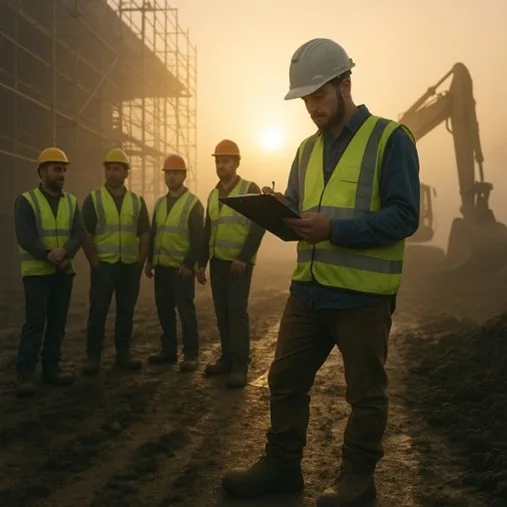
Some of my earliest lessons in leadership came not from books, but from standing in muddy fields at six in the morning, waiting for a delivery that might never arrive. When I started Damien Reilly Construction, I was in my twenties, full of energy but with no manual on how to lead a team. What I did have was responsibility. Thirteen employees depended on me to get it right, to make sure there was work, to make sure it was safe, and to ensure they got paid on time. There was no safety net. There was just the job and the people doing it.
On civil infrastructure projects with Carnisle Excavation, things got more complex. I found myself managing multiple crews across several locations, dealing with government contracts, liaising with engineers, and coordinating machinery and materials that never seemed to arrive in the right order. I didn’t have an HR department or a project scheduler. I had a whiteboard in the van, a phone full of numbers, and the obligation to be both calm and clear. If I was unclear, people made mistakes. If I didn’t show up, morale dropped. I had to become the rhythm of the team.
The best thing I learned during those years was the power of fairness. If a man knew he’d get paid properly and treated with respect, he’d do the job right. I kept things honest and direct. I was never afraid to pitch in, whether that meant moving blocks or filling out grant forms. That visibility mattered. The lads knew I wasn’t just barking orders. I was there when it rained sideways, when the plans changed, and when we had to stay late. It wasn’t about hierarchy. It was about presence and consistency.
Those early experiences taught me that leadership doesn’t begin when you’re in charge. It begins when you take responsibility for people and outcomes. On a building site, there’s nowhere to hide. That kind of raw environment either breaks you or shapes you. For me, it did the latter, and gave me a foundation I’ve carried ever since.
- Managing in Extreme Conditions – Mining in Australia
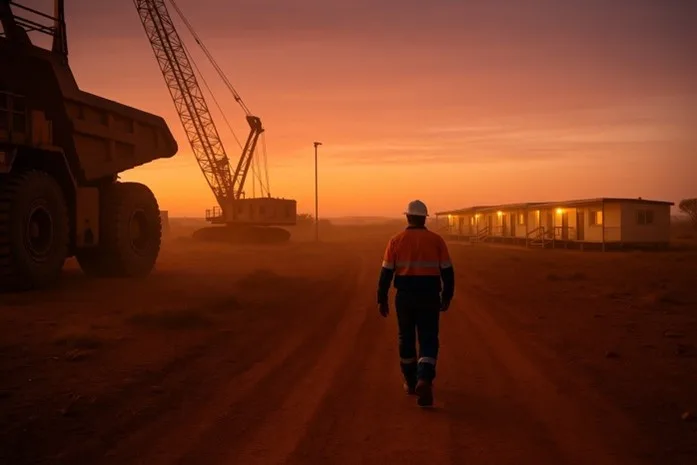
When I took the role in Western Australia with Cashmere Enterprises, I had already learned how to lead teams in tough conditions. But nothing quite prepared me for the heat, the distance, or the intensity of fly-in, fly-out mining work. The remoteness wasn’t just geographical. It was emotional too. You were dealing with men who were thousands of miles from their families, working long shifts, often in dangerous environments, with very little margin for error. In that kind of setting, leadership becomes something deeper than just oversight. It becomes pastoral.
I wasn’t managing a workforce from behind a desk. I was living with them, rotating in and out on the same flights, sleeping in the same prefab quarters, eating in the same mess hall. That proximity meant people looked to me not just for direction, but for stability. It also meant I had to learn fast how to spot fatigue, conflict, or distress before it turned into something more serious. I introduced a three-tier rotation system to reduce burnout and built a digital onboarding tracker so new arrivals didn’t fall through the cracks. But beyond the tools, it was really about connection. I learned to check in quietly, to ask better questions, and to listen to what wasn’t being said.
There was one moment I’ll never forget. A young worker had started missing shifts. Normally, that kind of unreliability would lead to dismissal. But something told me to talk to him first. Turned out he was struggling with homesickness and had no idea how to ask for help. We adjusted his schedule and arranged a support call. He ended up becoming one of our most consistent team members. That incident reinforced a lesson I keep returning to. In extreme environments, emotional intelligence is not a soft skill. It is the hardest and most necessary part of leadership.
That period in the mines changed how I thought about responsibility. It deepened my sense that leadership is not about command. It is about care, about building a culture where people feel seen, respected, and safe enough to do their best work even when conditions are against them.
- Hospitality as Human Leadership – Reilly’s Irish Bar Tavira

After years in construction and mining, opening Reilly’s Irish Bar in Tavira was both a leap of faith and a return to something more human. I wanted to create a space that felt like home, not just for the Irish community abroad, but for locals too. What I found in hospitality was a different kind of leadership. It wasn’t about machinery or deadlines or site regulations. It was about people, culture, and rhythm. You had to be present every day, in the moment, tuned into the energy of the place. When the doors opened, the mood of the staff, the flow of the customers, the pulse of the room , all of it rested on the kind of environment you had cultivated behind the scenes.
Running the bar taught me the difference between authority and atmosphere. I managed a small, multilingual team, and none of the standard corporate playbooks applied. Instead, I focused on respect, communication, and consistency. I trained staff not just in pouring pints, but in reading the room, making customers feel welcome, and responding to problems without waiting for instructions. During busy nights, especially during GAA matches or community fundraisers, the place could be chaos. But if your team knew the values, if they felt ownership of the culture, it worked. That kind of intuitive service didn’t come from rules. It came from trust.
One of the most meaningful things we did was host language nights and charity events. These weren’t just good for business. They built connection. Locals who had never stepped into a tourist pub began to show up because they saw themselves in what we were doing. That was leadership too , creating a place where people felt they belonged. And when off-season came and the town emptied out, it was those relationships that kept the bar afloat. People came back not for the drinks, but for the feeling.
Hospitality reminded me that leadership is also emotional labor. It’s about tuning into the invisible threads that hold a team, a venue, a community together. It’s about knowing that sometimes the smallest gestures carry the biggest weight.
- Bridging Enterprise and Advocacy – My Independent Campaign
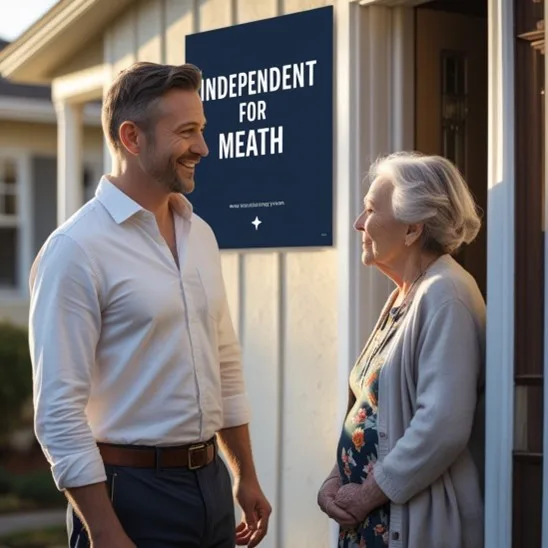
When I decided to run as an independent candidate in the 2024 general election, it wasn’t because I had political ambitions in the traditional sense. It was because I had spent twenty years in business seeing, firsthand, the distance between policymaking and reality. I had worked in construction sites where planning processes held up urgently needed housing. I had seen community areas bypassed for infrastructure funding despite having willing workers and viable land. I had managed teams in Australia and Portugal, and yet when I came home, I saw Irish towns struggling to hold onto young people or attract long-term enterprise. Running for office, for me, was a natural extension of the leadership I had already been practicing , just now directed at the systems level.
My campaign was built from the ground up. Without a party behind me, I relied on the same principles that had sustained me in business , honesty, presence, listening, and showing up even when it was inconvenient. I set up a digital platform that allowed local residents to log concerns and track responses. I created policy proposals rooted in lived experience, like a Rural Investment Readiness Bill and a framework for community benefit agreements that ensured investment was not just announced, but delivered in ways people could see and feel. Every idea I put forward was drawn from something I had already wrestled with in practice , how to reduce red tape, how to align incentives, how to deliver outcomes people could trust.
What surprised me most was how hungry people were for practical thinking. At town halls and on doorsteps, I heard over and over that politics felt like noise to them. But when I talked about what I’d learned building businesses, navigating foreign licensing systems, or running multi-shift operations in the Pilbara, people leaned in. They didn’t care about ideology. They wanted someone who could solve a problem, explain a policy without jargon, and show up when it mattered. That reaffirmed my belief that the line between enterprise and advocacy is thinner than most people think.
Although I didn’t win the seat, I won something else , a renewed conviction that leadership, at its best, is about service. Whether on a building site, in a bar, or at the ballot box, the principles remain the same: listen deeply, act clearly, and never make promises you cannot keep.
- Conclusion: From Enterprise Lessons to Public Leadership
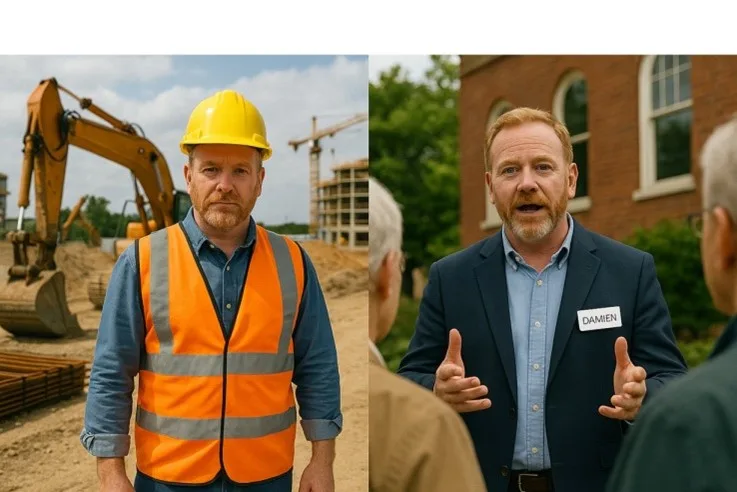
When I launched my independent campaign, I didn’t choose politics, I stepped into the public domain because the problems I had faced on worksites and in small businesses were still waiting for solutions in policy. My time in construction, mining, hospitality, and technical services had taught me that leadership must be visible, practical, and human-centred. Those same values guided my approach to public engagement.
On my website, damienreilly.ie, I outline three core policy commitments that flow directly from my professional experience: reinstating Article 48 to return power to communities, developing rural hub structures for sustainable growth, and introducing a Community Action Plan to increase transparency and accountability in constituency representation meathchronicle.ie+4damienreilly.ie+4damienreilly.ie+4. None of these are abstract promises. They arise from seeing how slow planning systems delay housing, how lack of infrastructure stifles job creation, and how constituents often feel left without a voice.
For example, Article 48 is about more than constitutional reform. It is about embedding community agency into policymaking , the same principle that governed how I structured teams on-site, listening and responding before problems escalated. Rural hubs reflect my belief in place-based planning , clusters of homes and services that make local enterprise feasible, just as in construction you need the foundations before you build up. The Community Action Plan, with its documented clinics, public issue tracking, and real-time updates, mirrors the workflows I built when managing multiple teams or running TV Pro Ireland , structured but flexible, visible but human.
Although I did not secure a seat, the campaign’s impact came not from traditional political strategy but from lived credibility. When people saw I spoke in straightforward terms and understood the “how” of delivery, they leaned in. They did not hear “politician.” They heard someone who could deliver. That response reinforced something I’ve always known: the greatest public leaders may begin as experienced practitioners, not career politicians.
- Policy, People, and Practical Experience
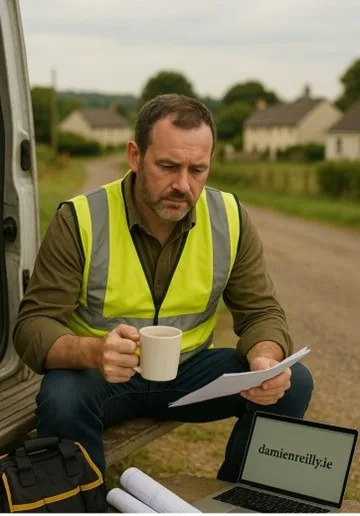
When I made the decision to run for office, I didn’t enter politics to chase titles or debate theory. I entered because I was frustrated, frustrated with the inefficiencies, the missed opportunities, and the hollow gestures that too often define policy for rural Ireland. I had spent years running businesses, managing teams, solving problems under pressure, and navigating red tape. And I realised that many of the barriers I faced were not personal, they were systemic. They were policy gaps.
From housing bottlenecks to delayed planning permissions, from underused rural land to skills mismatches, I could see that policy had become too detached from the people it was meant to serve. That’s why my campaign platform wasn’t built around soundbites, it was built around delivery. I proposed concrete mechanisms like reinstating Article 48 of the Constitution to give more power back to communities. I championed the development of Rural Hub Structures, not as handouts, but as blueprints for locally driven economic growth. And I pushed for a Community Action Plan, a simple but effective system where constituents could submit issues and track the response and outcomes.
These weren’t vague promises. They were drawn directly from what I’d seen in the field, how lack of accountability leads to drift, how top-down schemes miss the ground realities, and how leadership often fails when it hides behind procedure instead of stepping forward with solutions. When you’ve run a mining camp where worker fatigue can make or break a project, or when you’ve held the keys to a small Irish bar in Portugal, or shown up to fix a family’s broadband before dinner, you learn the importance of visibility, responsiveness, and trust.
In my campaign, I brought that same frontline mindset to every doorstep, community hall, and public meeting. I didn’t need to pretend to understand ordinary people, I am one. I spoke their language, not out of strategy, but because it’s the only language I’ve ever known. My website, damienreilly.ie, reflects that grounding. It’s not flashy, but it’s honest. It outlines clear policies, community commitments, and a real plan for action. It’s a continuation of everything I’ve built across sectors: functional systems that solve real problems for real people.
- What I’ve Learned About Job Creation
If there’s one lesson I’ve learned from all my years in business, it’s that jobs don’t magically appear because someone in an office draws up a grant scheme. Real job creation starts with removing friction, cutting through the red tape, listening to what local employers actually need, and making it easier to start and scale businesses that already want to grow.
When I built TV Pro, it wasn’t part of any government initiative. I saw a growing need for home tech services and just got on with it. I created a business model that worked in my area, trained workers when I needed help, and kept refining how we operated until the customers came back. That same mindset was present in my earlier ventures, whether building houses in Meath or managing teams in Australia’s mining industry. You build trust. You deliver quality. You create something stable that others can rely on. That’s the root of real employment.
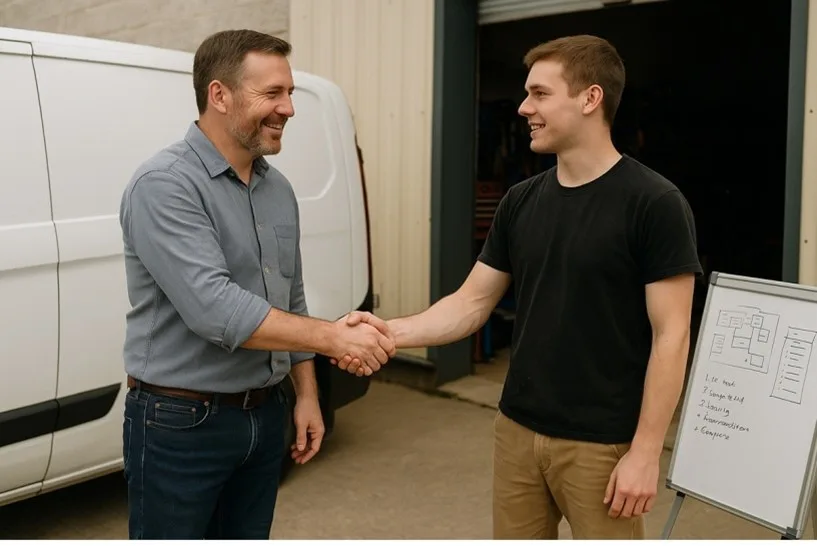
What frustrates me is how disconnected most policy is from these kinds of realities. In one of my articles, “Rebuilding from Within,” I argued that job creation isn’t about flashy ribbon-cuttings or once-off investments. It’s about building up local capacity, training people where they live, supporting small businesses that hire their neighbours, and creating infrastructure that actually serves enterprise.
That’s why, in my policy work, I’ve proposed things like a Rural FDI Readiness Toolkit and Community Benefit Agreements. If a company is going to come into a town and promise jobs, there needs to be a clear way to measure whether those jobs actually materialise, and who benefits from them. I’ve spoken with people in Meath who’ve watched sites get rezoned, foreign investment announced, and then nothing happens. A gate goes up, a sign gets planted, and the community is left wondering what went wrong.
Through my own work and writing, I’ve pushed for more local oversight and accountability, not to block investment, but to make it stick. Jobs only count when they’re filled. Investment only works when it delivers. We need planning rules that are friendly to job-generating businesses, skills training that actually lines up with what’s needed, and community structures that keep track of progress, not in spreadsheets, but on the ground.
In every role I’ve held, from bar manager to construction lead to political candidate, I’ve seen the gap between intention and execution. And I’ve tried to close it by showing up, rolling up my sleeves, and building what’s missing. I believe that approach is the only way to create jobs that last.
- Why Community Ownership Is the Missing Piece
Over time, I’ve come to believe that job creation alone isn’t enough. If we want real resilience in our towns and villages, we need to go one step further, we need to create structures where communities have a stake in the businesses and investments that shape their future. I’ve seen too many cases where outside investors come in, take what they need, and move on, leaving little behind but empty buildings and dashed expectations. Community ownership is about changing that cycle.
When I managed Reilly’s Irish Bar in Portugal, I built something from scratch in a place where I was a newcomer. But even as an outsider, I made a point of involving the community, hosting local musicians, organising charity nights, and turning the pub into a cultural hub. That experience taught me that ownership isn’t just about shares or deeds. It’s about emotional investment. When people feel that a place or project belongs to them, they protect it, nurture it, and help it grow.
That same principle applies in rural Ireland. In my article “Trusted Bridges,” I explored the idea of community-led investment platforms, spaces where local groups can pool resources, partner with ethical investors, and co-develop projects that match their values. Whether it’s a solar farm, a co-working hub, or a small manufacturing unit, the goal is to ensure that profits, decisions, and risks are shared.
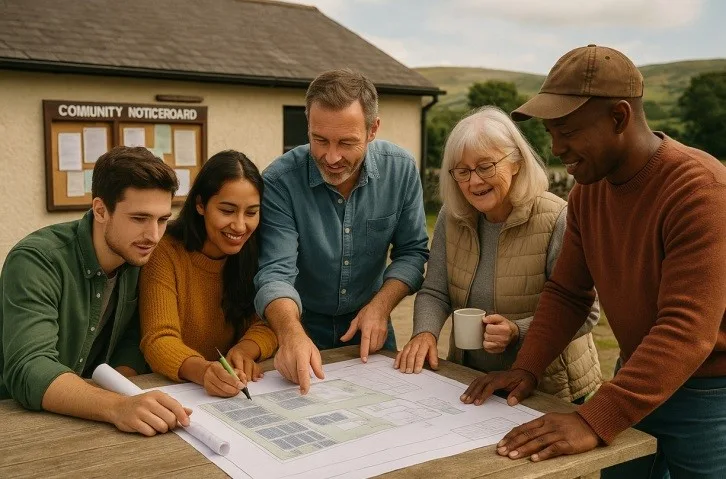
One of the most practical steps toward this is embedding Community Benefit Agreements into the planning process. If an investor wants to build on local land, they should agree in advance to support schools, sports facilities, or apprenticeship programs. These agreements don’t just redistribute wealth, they build long-term trust.
And trust is key. People in rural areas have long memories. They remember who showed up during hard times, who broke promises, and who delivered. By giving communities more control, not just over budgets but over business, we create a more durable foundation for growth. Ownership fosters responsibility. Responsibility builds pride. Pride turns into momentum.
That’s the model I’ve been advocating through both my business work and my policy proposals. It’s not pie-in-the-sky theory. It’s grounded in what I’ve seen work across multiple sectors and countries. If we want to future-proof rural Ireland, we need to stop thinking of community as a charity case and start seeing it as a business partner.
- Policy Innovation Through Lived Experience
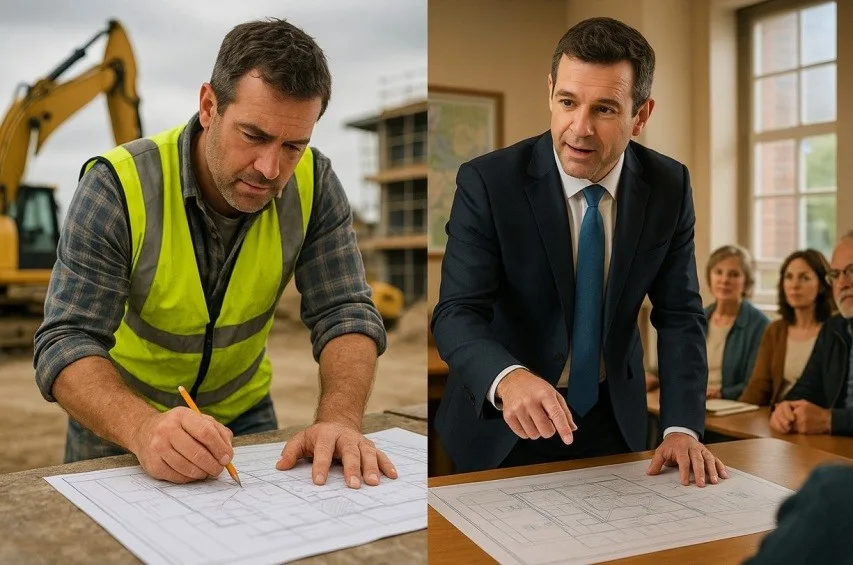
When I entered public life as an independent candidate, I didn’t come with a manifesto written by party advisors. I came with two decades of hard-earned experience across sectors , construction, mining, hospitality, digital services , and a belief that practical insight should drive policy, not the other way around. I’ve always been someone who learns by doing, not theorising. That same approach shaped how I designed my policy platform and why I continue to advocate for grounded, actionable change.
Too often, I saw policies being proposed that simply wouldn’t work in the real world. Whether it was planning guidelines that ignore on-the-ground logistics, or investment schemes that favour large urban projects while rural towns are left to struggle , the gap between policy and practice kept widening. My goal was to close that gap. I wanted to build a bridge between those who make decisions and those who live with the consequences.
Take the Rural Investment Readiness Bill I proposed during my campaign. It wasn’t a theoretical piece , it was rooted in the bottlenecks I had faced as a builder and business owner: delays in planning permissions, lack of clarity for investors, and disjointed local authority processes. That proposal came not from a think tank, but from a tradesman who has waited on site for inspectors to show up, or had to explain to clients why a build had stalled because of red tape.
I also developed the Community Action Tracker , a digital tool designed to bring transparency and follow-through into local representation. Too many people told me they had reported issues to politicians and never heard back. I wanted to change that dynamic by making issue tracking real-time, public, and accountable. Again, the idea came from business: if a customer calls you with a problem, you log it, you track it, and you solve it. Why should public service be any different?
My approach to policy is the same as my approach to building: start with the foundations, involve the people who are affected, and stay close to the work. That’s how you earn trust , not just at the ballot box, but in every corner of a community.
That’s why I believe lived experience isn’t a weakness in politics , it’s a strength. It teaches you what actually works. It shows you where the systems break down and where the real opportunities lie. And it gives you the humility to know that no plan survives without real engagement from those it’s meant to serve.
- Conclusion: From Groundwork to Governance
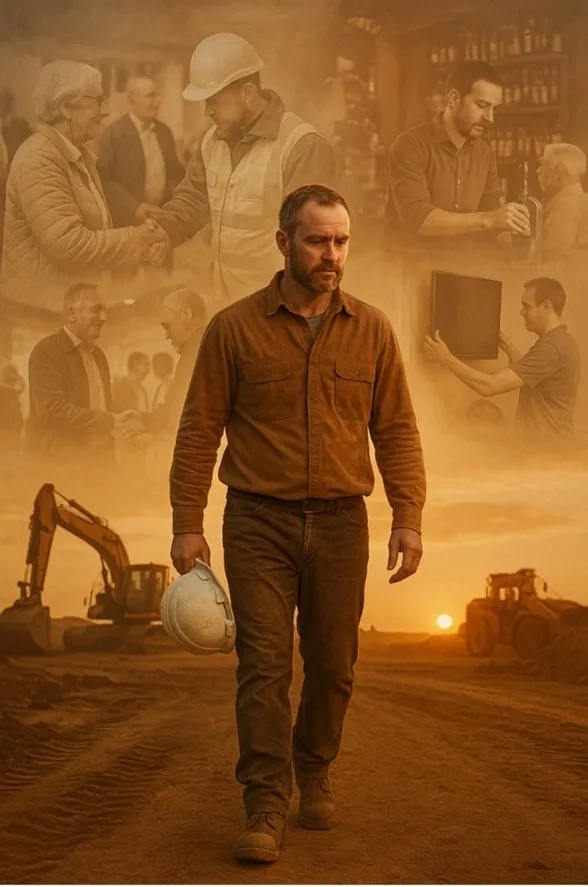
Looking back over the path I’ve taken , from managing a crew on a muddy construction site to sitting across from voters in a rural community hall , I see a common thread: the belief that meaningful change starts at ground level. Whether I was laying foundations for a family home, leading a team in remote mining operations, running a bar in Portugal, or wiring a pensioner’s TV system in Meath, I was learning how systems either support people or let them down. I was also learning how to lead, fix problems, and stay accountable. These lessons didn’t come from books. They came from lived experience , often hard-earned, sometimes humbling, always formative.
What hasn’t been said yet, but deserves mentioning, is the importance of adaptability. Every sector I worked in presented new rules, new pressures, and new cultures. And every time, I had to reset, relearn, and rebuild trust from scratch. From securing planning permission for builds, to managing mental health challenges among FIFO mining workers, to adapting my service model during a pandemic , I didn’t have a blueprint. I had to make one. That skill, the ability to adapt under pressure, is what prepared me for politics far more than any policy seminar ever could.
I also haven’t talked much about the emotional toll of trying to make things better in environments that often resist change. There’s a loneliness that comes with accountability, with being the one who has to decide, fix, or front up when something goes wrong. But it’s also where growth happens. It’s where you learn how to balance empathy with boundaries, vision with constraints, and community with credibility. These aren’t soft skills. They’re survival skills in leadership.
Now, as I prepare to pursue a PhD by Portfolio, my goal is not to become an academic for the sake of titles. It’s to turn all of this into something that can serve others , communities like mine, businesses like the ones I’ve built, and future leaders who need to see that credibility can come from concrete, not just from credentials. My research will focus on job creation, investment design, and economic resilience. But its roots will always be in the stories shared here , stories of people, place, pressure, and purpose.
In the end, whether I’m fitting a satellite dish or debating rural planning policy, my approach is the same: be present, be useful, and leave something behind that works better than what you found. That’s leadership to me. And that’s the work I will continue to do , from the ground up.

